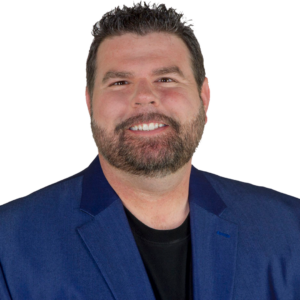Stuck in the status quo
A few years ago, a ridiculous but accurate commercial made the rounds on social media. This ingenious video depicted a hurried man and woman on an escalator rushing to get to their destinations on another floor. They are chugging along when suddenly, without warning, the escalator halts to a stop about half way up.
The annoyed man reassures the woman, somebody will come. When no one does, he screams, “There are two people stuck on an escalator, and we need help! Now, would somebody please do something?” Silence follows as the camera pans to an empty office complex. They stand, wait and yell for anybody to come rescue them. Their prayers are answered when a repairman with toolkit in hand appears riding up in the escalator next to them. That is until his escalator abruptly comes to a halt as well.
Obviously, they could have easily just walked up the remaining steps, but they were stuck. Mentally stuck, that is. Like so many of us in aging services.
The residents and team members who live and work in organizations that are stuck pay a significant price. They are surrounded by complacency, negativity and an acceptance of the status quo. Top performers leave to work someplace else, someplace that is more forward thinking.
The good news is the opposite is also true. There are organizations that walk the remaining steps on that escalator. In my experience, these organizations that fight the victim mentality attract top talent, encourage peak performance and have strong organizational outcomes to show for it.
One example is Bergen Regional Medical Center in Paramus, New Jersey. Their leadership team had multiple reasons to maintain status quo: an 80-year old institutional building, nine unions, 574 residents, the majority with a psychiatric diagnosis and a large Medicaid population instead, they recognized a need to do better. They wanted to understand the individuality of each person, especially residents living with dementia, and get staff buy in and support on a much deeper level. The team at Bergen embarked on an 18-month Civil Money Penalty Fund project, “More than Meds,” funded by the New Jersey Department of Health and Centers for Medicare & Medicaid Services.
Far from stuck, Bergen faced its barriers head on and residents, family members and staff reaped the benefits. It was a multifaceted approach. Some key steps included:
- Conducting focus groups and interviews with representatives from key stakeholder groups
- Facilitating leadership, supervisor and staff retreats
- Reviewing and prioritizing recommendations from the assessment phase
- Creating an active Champions of Change Committee that included residents, family members and various levels of staff to work on a step-by-step plan
- Ensuring quick wins, such as dementia education for residents, including a Korean speaking neighborhood, which could have been seen as another barrier
- Reporting progress on a regular basis to stakeholders to maintain support and increase sustainability
- Sharing successes and lessons learned with other organizations through presentations and writings.
The outcomes?
- 90 percent of staff reported new communication techniques helped them better meet the needs of residents while nearly 80percent said their communication between staff greatly increased.
- 44 percent of staff indicated they saw a “great improvement” by utilizing a new resident social profile to better meet the needs of residents
- The number of residents who said “staff speaks to me respectfully” increased by 10 percentage points
- A resident-led peer support group formed to provide emotional support to fellow residents
- Residents were also educated on the best way to support other residents living with dementia.
Those numbers became real when I was about to get off the elevator. Anne, a resident and active member of the Champions of Change Committee, took one look at my face and exclaimed, “Ohhhh no! I’m not volunteering for anything else. I’m too busy!” We laughed and she told me how, in addition to the committee, she was also volunteering to lead the Peer Mentor program where residents provide comfort to fellow residents in times of need. The peer mentors are especially helpful to new residents and following a resident’s death.
What made all this possible in an organization with so many valid barriers to person-centered care was the attitude of the team at Bergen. Instead of helplessness, the team adopted a stance of empowerment and proactivity. Here are three specific actions that yielded impactful results:
Communicate, and then communicate some more
It seems obvious, but communication is consistently the greatest opportunity for improvement that I hear when my company facilitates organizational assessments. When you are introducing a change, explain to team members, residents and family members what is happening and why. Schedule one-to-one meetings, team meetings and group forums to share information. Allow time for two-way communication. This isn’t just about you sharing information. You want to receive information from them, too.
Make inclusive goals
If you want people to embrace a change and want that change to sustain, you must give team members, residents and family members ways to contribute. Bergen’s goal was to change their culture from one that was task oriented to one that is person centered. Their many successes were based on the fact that they changed attitudes by changing behaviors. They wanted residents to have lives filled with meaning and purpose, so they created opportunities for them to contribute such as the Peer Mentor program and committee membership.
Model the way for others
If you want your team to act a certain way, be mindful of your own actions. Too often as leaders we want team members to treat residents a certain way but then fail to treat the team members similarly. Bergen didn’t just focus on what they could do to make life less task driven for residents. They started with educating team members on new processes, such as staff huddles to improve communication.
As leaders in aging services, we want to do more for our residents and team members, but our plates are so full it seems impossible. We wind up putting out fires all day instead of working on the projects that can make a real impact. What can you do to change the mentality of yourself and others so you don’t get stuck on an escalator?
Encourage more active behaviors from employees and refuse to play into victim mentality. Challenge your team to get unstuck by tapping into the More than Meds free resource. The online resource toolkit is full of inspiration, practical tips and a step-by-step guide to creating change in your organization.
You can stay stuck on the escalator screaming for help as you try to reach your destination, or you can charge up those stairs and get there on your own. The next step is up to you.
 Denise Boudreau-Scott is President of DRIVE, a consultancy that helps healthcare organizations improve the resident and staff experience. She is also a former nursing home and assisted living administrator. She can be reached at denise@cultureoutcomes.com.
Denise Boudreau-Scott is President of DRIVE, a consultancy that helps healthcare organizations improve the resident and staff experience. She is also a former nursing home and assisted living administrator. She can be reached at denise@cultureoutcomes.com.
Related Articles
Topics: Articles , Executive Leadership , Leadership , Staffing











